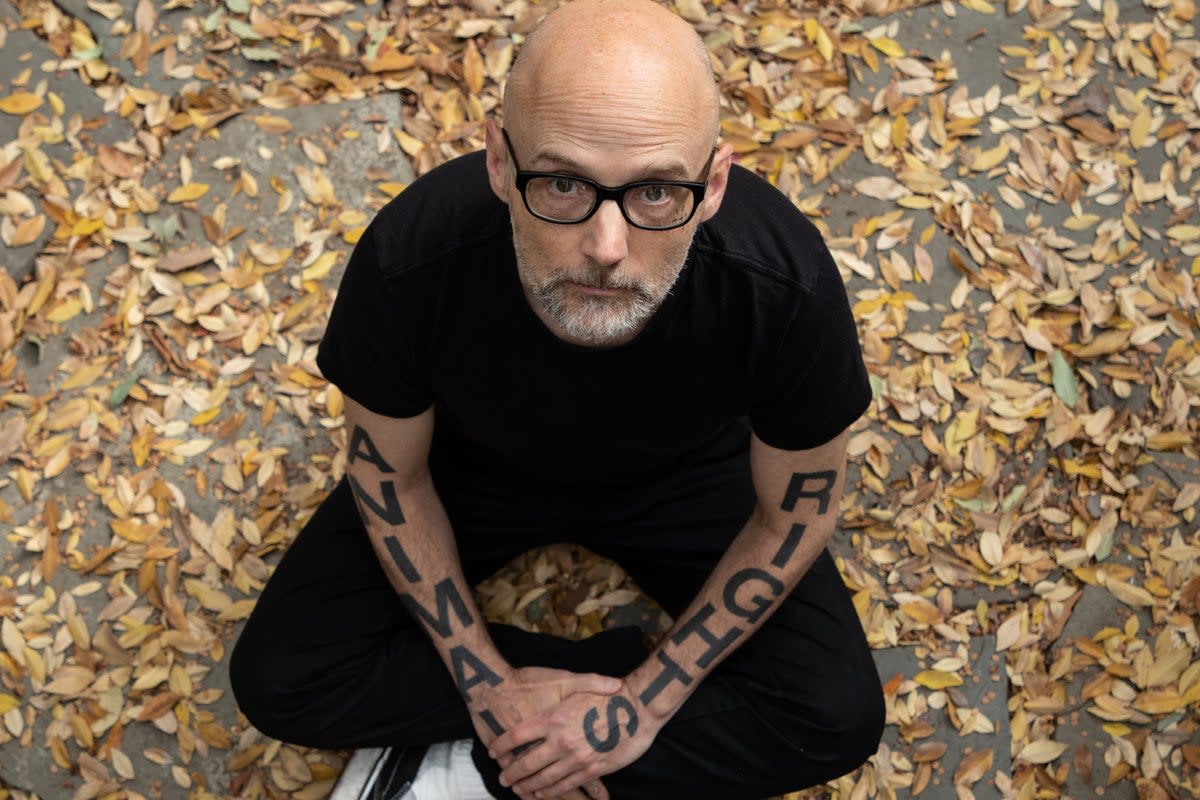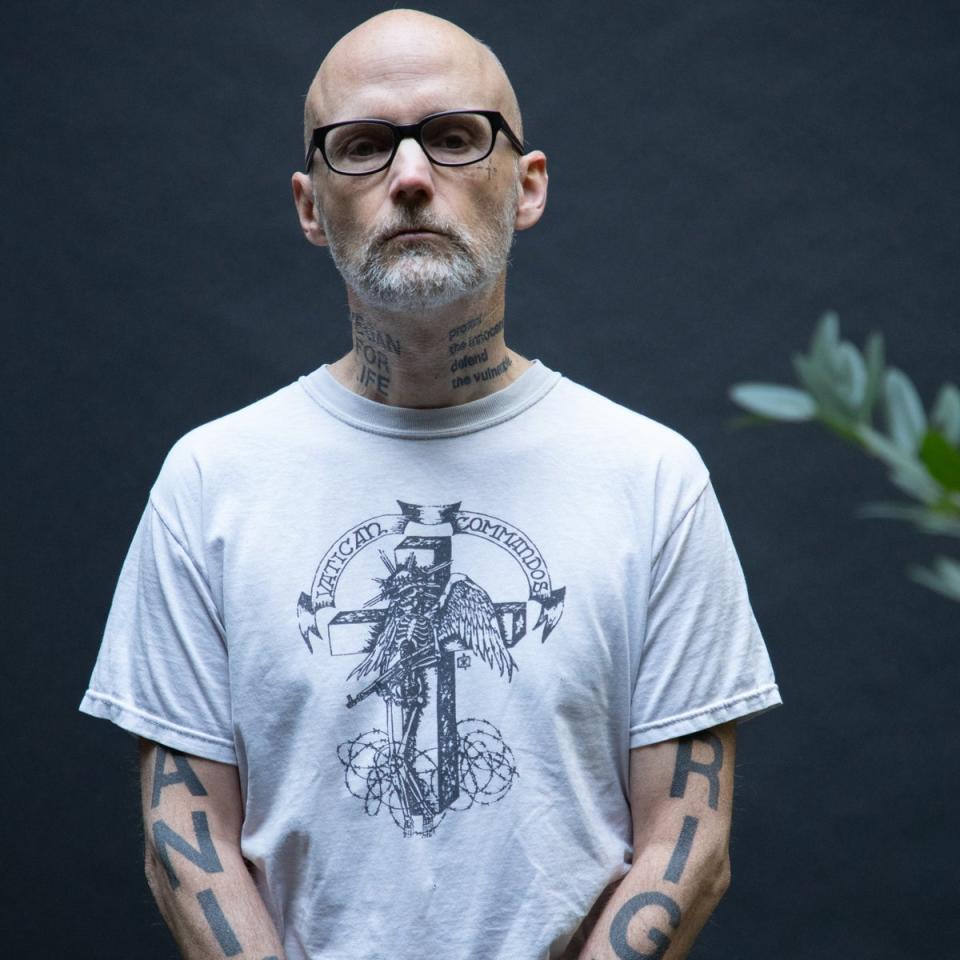Moby on his new album, wedding singers and criticism: ‘Why would I hand my wellbeing over to a bot army?’

Two decades ago, the world’s most famous electronic musician met a doctor who changed his life. Moby – named after literature’s most famous whale, which was created by his great-great-great uncle – met Oliver Sacks, who helped open the Institute for Music and Neurologic Function in 1995. “I’d been a musician since I was very young,” Moby says, “but until meeting Dr Sacks, I hadn’t thought that what I did was anything more than light-hearted entertainment.”
That the formerly wild music star had an epiphany after meeting the neurologist famous for writing The Man Who Mistook His Wife for a Hat, may seem like an odd clash of cultures. But Moby is a complex creature, a man whose past debauchery stands in contrast to his smart, meticulously calculated music. In conversation too, he’s intellectually precise; if it weren’t for the tattoos on his arms and neck, it’s easy to picture him in a lab coat.
Today, Moby sits on the board of the Institute, which has lent scientific gravitas to the idea that music can be palliative. He tells me he’s no longer interested in his career per se, but rather in creating songs “that have profundity, beauty, and an ability to transcend.”
Moby is giving this interview from his kitchen. It’s a neat, functional space: the architectural equivalent of the sleek sound he pioneered in the Nineties with hits including Porcelain, Go, and Natural Blues. The turn of the century marked his commercial and cultural zenith; he counted David Bowie among his best friends and his 1999 album Play sold 12 million copies worldwide – more than any other electronic record ever.
What happened next has been well documented: tales soaked in booze and fuelled by drugs and romantic misadventures pepper the pages of his own memoirs, the aptly titled Porcelain (2016) and Then It Fell Apart (2019).
Moby has also faced external criticism during his career. He’s been denounced by electronic purists for ‘selling out’ after he licenced all the tracks from Play for commercial use. He’s been ridiculed for the veganism he so proudly espouses: the slogan Animal Rights tattooed on his arms and Vegan For Life on his neck. And he’s been called a liar by Natalie Portman, who he claimed to have dated but whose own memory is that of a man loitering around her in a nightclub when she was only 18.
Moby admits he’s often prone to solipsism; but when I ask him whether he feels some of the criticism has been unfair, he shrugs it off. “I’m aware of how badly both memoirs sold. Do I feel misunderstood? It doesn’t really matter.” He’s learnt to make concessions. You can’t be everyone’s cup of tea, so to him, there’s no use trying to control the narrative.
“I don’t read comments or reviews,” Moby goes on. “It’s destructive to let your sense of self be informed by the glib opinions of people you’ve never met – especially if they’re not real people. Why would I hand over my wellbeing to a bot army in Belarus?”
Moby’s ditched popularity for causes. This February, he released Punk Rock Vegan Movie, a dive into the Seventies-born movement and its role in inspiring animal rights activism. The film is available to watch for free YouTube: rather than making money from it, he’s more interested in spreading the message of veganism as widely as possible. Animal rights campaigning, he says, is his “ethical duty”.
“It’s excruciating,” he acknowledges. “I think every activist will agree that no one wants to be an activist.”
Unlike some, Moby puts his money where his mouth is. “I work with VC [venture capital] funds and invest in companies that offer alternatives to animal-based produce,” he says. As the founder of production company Little Walnut, he’s raised funds for films including Slay, about the fashion industry’s abuse of animals, and the 2021 documentary short Why I’m A Vegan. “I try to use whatever resources and platforms I have to somehow move the needle towards a more compassionate, more rational future,” he says.
In 1996, Moby released an album called Animal Rights to draw attention to the issue; but he’s never successfully written issue-oriented music. “I’d love to be as gifted as Neil Young or John Lennon,” he laughs. “You listen to What’s Going On by Marvin Gaye and think, what a remarkable use of music and lyrics.” His own attempts to write issue-focused songs always yielded something he felt was “dry, pedantic and didactic”.
Moby measures each of his words carefully; his crisp, clear enunciation feels quasi-academic. He loves an -ism, and name checks multiple philosophers as we explore the motivations behind his new projects. There’s history behind this: Moby majored in philosophy at university and once thought of making it his career. “I was gonna get my doctorate and teach philosophy in New England at a community college – and just make music in my basement that no one paid attention to,” he laughs.

In lockdown, he revisited many texts from his undergraduate days, looking for meaning at a time when life seemed to stand still.
There’s an existentialist flavour to Moby’s new album, which rethinks his past material into new, more grandiose compositions. Released earlier this month, Resound NYC transforms songs from across the Moby canon: tracks once known for their electronic appeal have been reimagined as rock numbers, sung by the likes of Lady Blackbird, Gregory Porter, Ricky Wilson, musical theatre powerhouse Marisha Wallace, and Nicole Scherzinger. Moby’s favourite collaboration, however, isn’t with a big name.
“One of the last tracks on the record is Run On, with Danielle Ponder,” he says. The original song, from the Play album, samples the hook from Run On for a Long Time, a 1949 recording by Bill Landford and The Landfordaires – which Ponder’s father, Elijah, sang while growing up in the deep south. Elijah is now 90 and has advanced Alzheimer’s; when Danielle visited him in hospital and told him she was singing Run On, he lit up and started singing the 1949 song.
“She held up her iPhone to him, made a voice note of him singing and sent it to me,” Moby says. “And it was so powerful that I threw away the production I had prepared and rewrote the entire song around his vocals.” Danielle came to the studio to record her part, and it became a duet. By chance Moby had stumbled onto something profound.
For him, it’s as much about the sound as it is about the story behind it. When It’s Cold I’d Like To Die – a song that’s been featured on both The Sopranos and Stranger Things, he says proudly – is another highlight, but one he says was laborious to produce. “It’s a weird song, in that there’s nowhere to hide.” He clarifies: “There’s no yelling, no vocal processing, no autotune, no background vocals – it relies on one singer being exposed and vulnerable.”
Moby worked with a numberof gifted vocalists to record this new version, but something always felt off. One day, someone on his team went to a wedding in Texas; he was impressed with the singer there, and asked Moby if he might consider him for the track. “I loved the idea of a wedding singer in Texas being the only one able to do justice to a song so poignant and delicate,” Moby laughs. The idea soon became reality.
Moby is a born raconteur. Beyond the faux intellectual posturing (which I don’t think he does on purpose) a man emerges who is in genuine pursuit of the profound. He’s no longer in the business of trying to be the cleverest or the most successful; he wishes, simply, to tell compelling stories, through music that is lasting and important.
He worries, he says, that his big claims on music and life might sound too self-aggrandising, but “what better use of a life is there than trying to create music that is profound and transcendent?” he asks. I’m still trying to think of a response.
Resound NYC (Deutsche Grammophon) is out now

 Yahoo News
Yahoo News 
